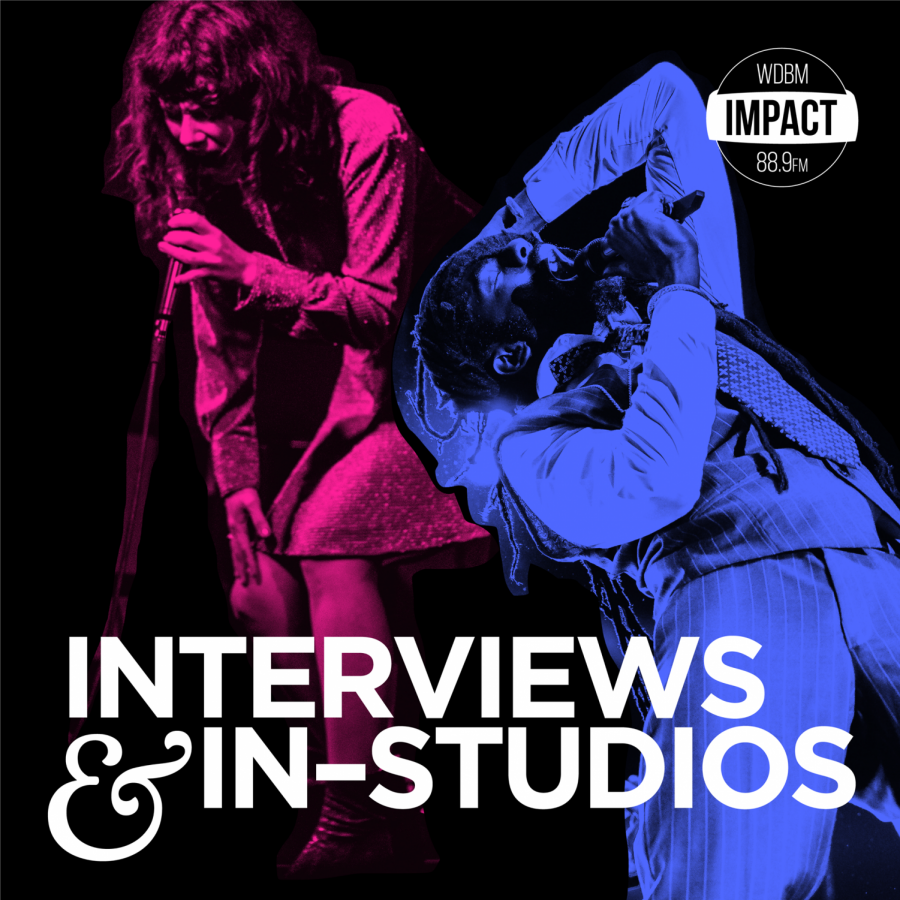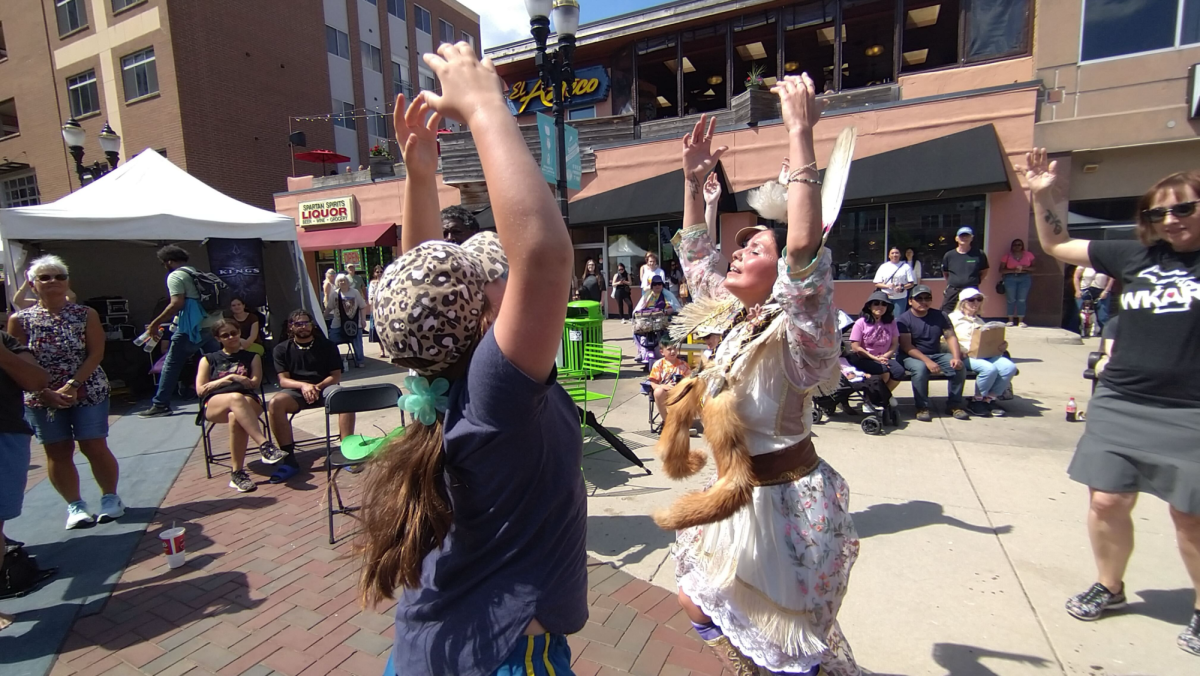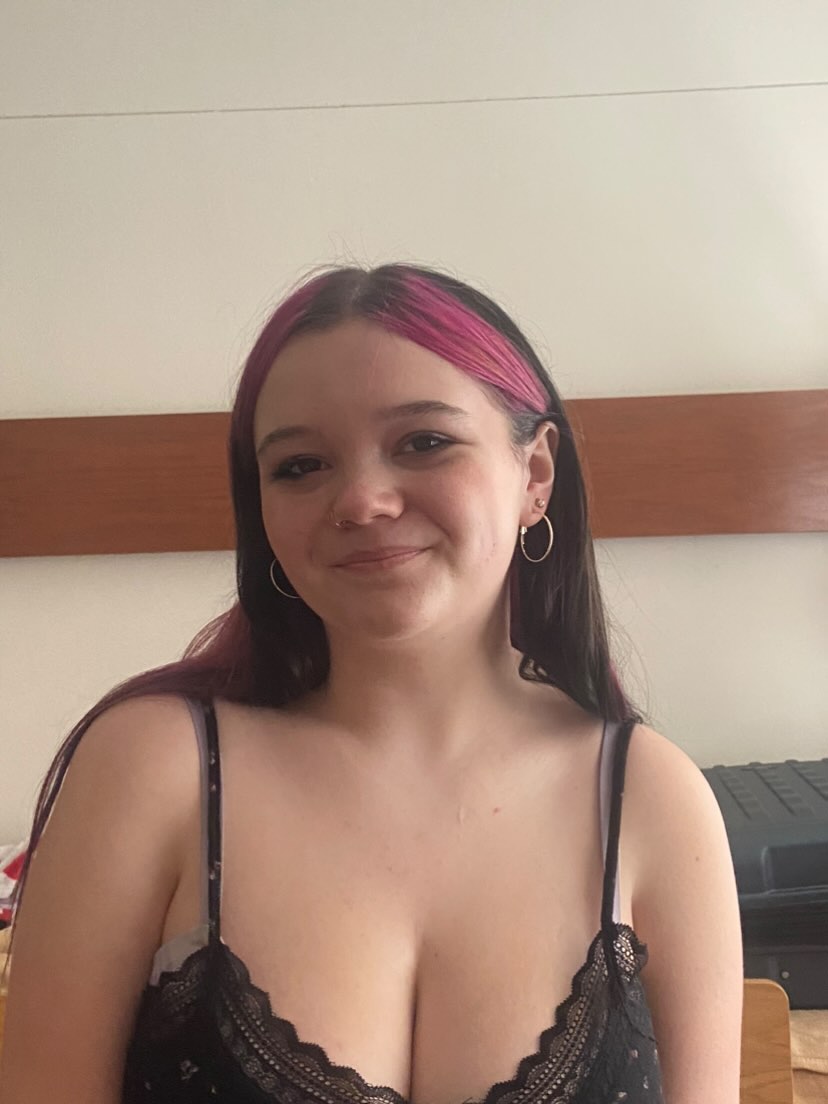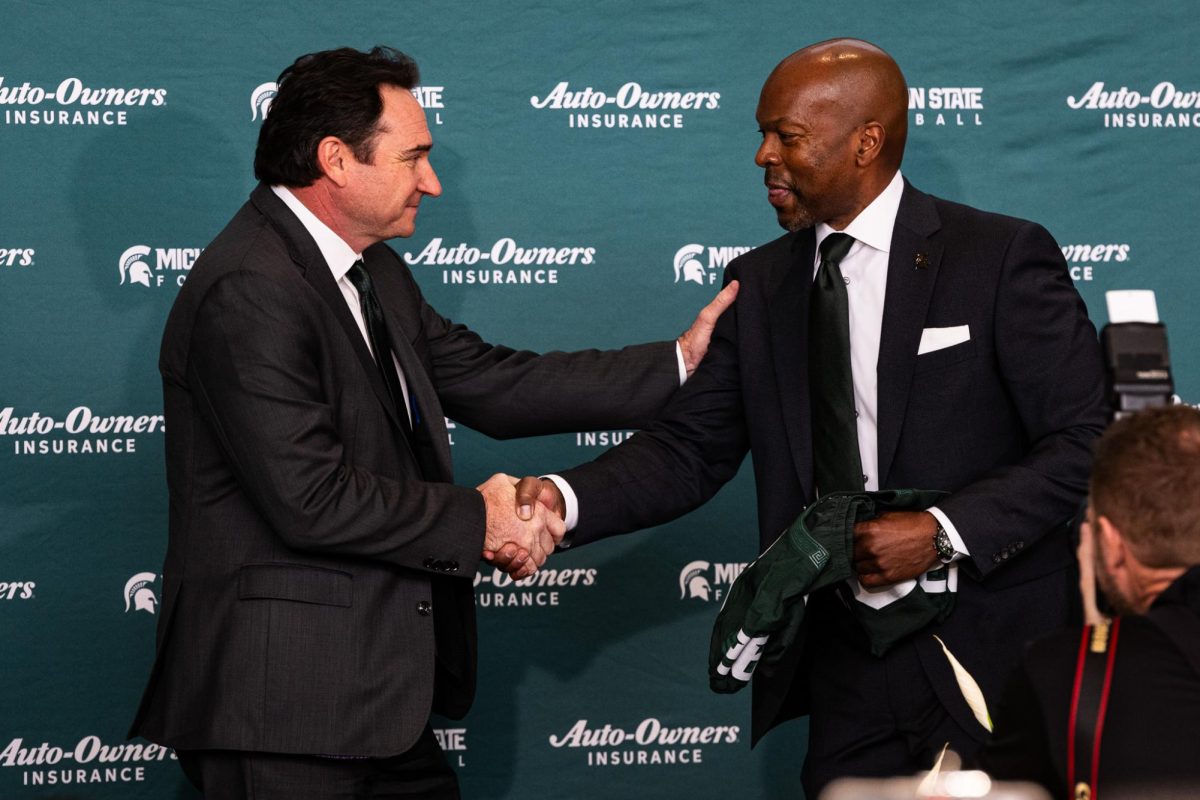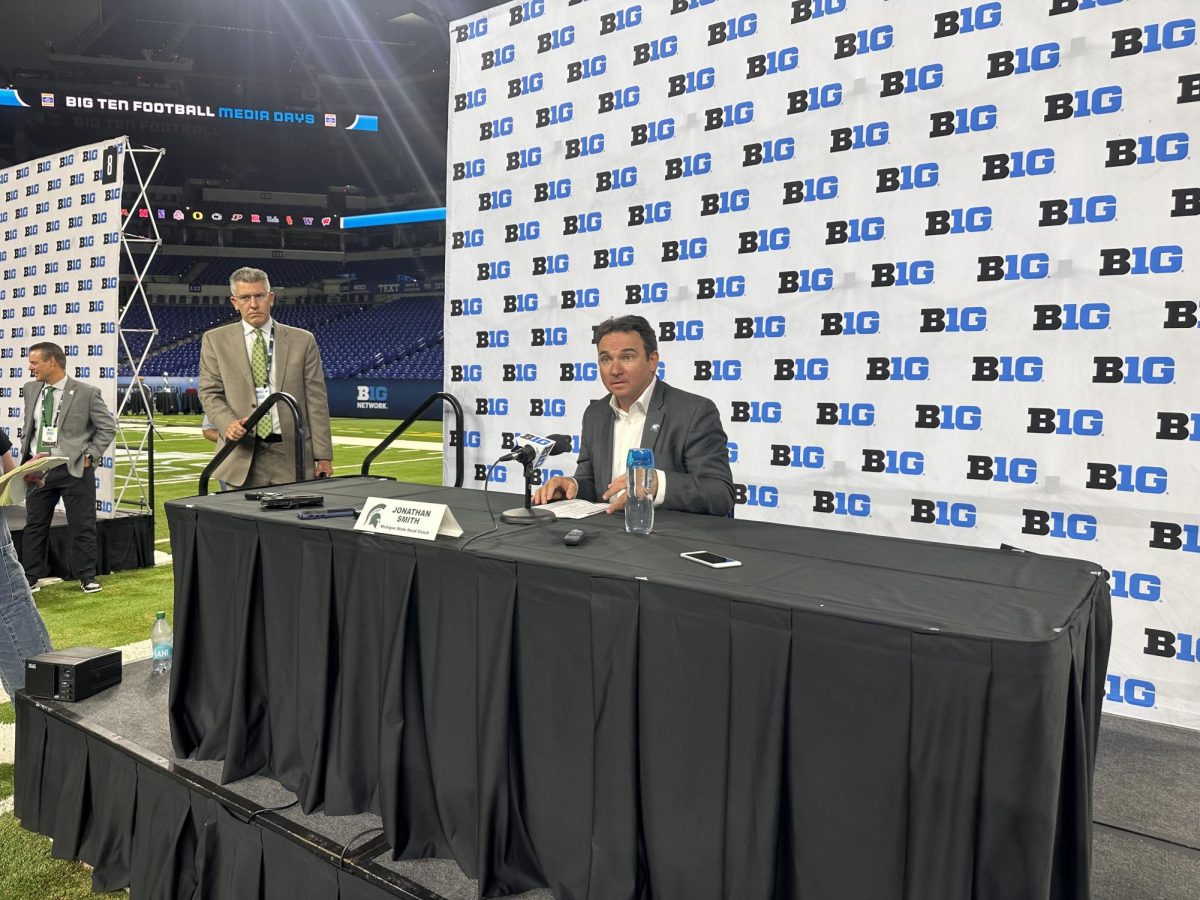Interview – 5/28/2020 – Charmer
June 23, 2020
Charmer frontman David Daignault gives us the rundown on the band’s new LP 𝘪𝘷𝘺. We discuss releasing music during a pandemic, battling with writer’s block, and what fans can expect next from the Northern Michigan band.
You can follow the band and learn more on Twitter and Instagram.
Transcript below:
Matt Burdick: Hey, I’m Matt Burdick with Impact 89FM. Gia and I are here with David from Charmer, a band from Northern Michigan that I am a very big fan of. How have you been lately, David?
David Daignault: Very good .
Gia Haddock: You guys don’t know this, but he has a dog in his lap right now, so he’s definitely doing very good.
Matt Burdick: What’s the dog’s name?
David Daignault: The dog is Trout. And it’s been thunderstorming outside, so he’s afraid of that. So that is why he’s on my lap right now.
Matt Burdick: Well nice to meet you Trout.
Trout: *yawns loudly*
Matt Burdick: Aw was that him? Okay, well you guys released your sophomore album just like a little under two months ago – ivy – and now that it’s been out for a little bit, people have heard it, it’s been around, how do you feel towards the album? Have your thoughts on it kinda changed at all?
David Daignault: No, I think it’s pretty much the same as when we recorded it and put it out. It’s good, it’s definitely weird with the quarantine going on, because we haven’t seen like the physical, we haven’t even seen the physical vinyl yet, and we haven’t played any of the songs live. So it kinda just feels like, you know, it’s not even out. For me personally. I don’t want to speak for all the band members, but it’s definitely different.
Matt Burdick: It’s weird, like not getting the live reaction and only being able to communicate through social media to see how people feel about it, I guess?
David Daignault: Yeah and I mean, really, when you’re just sitting at home and you don’t see your band mates, you know, you don’t have content to really post , and you have all these other bands with the same dilemma. So we’ve been trying to stay active, but like, I personally wouldn’t be on Twitter myself, like, as a person if I didn’t have a band, you know? So like, I’m not one to just be like, “Oh, you know…” so it’s hard in that sense.
And it’s hard not to think about how much traction, you’re losing not touring and promoting the album and playing it and spitting out content, you know, frequently like we do when we are playing. So it’s all very weird cause by the time shows do happen, probably like early 2021 is what you’re looking at for bands being back on the road. This album could very well come out and it’s probably going to just get like tossed to the side because by that time we’ll be on some new stuff. So it’ll be interesting in that sense. But the reaction has been great. We’re getting more attention than we ever have before, prior, with it being out. It’s just, we live in such a small, concentrated area so my everyday hasn’t changed. Like, I don’t see it unless I hop on social media, you know?
Matt Burdick: Yeah. And I think it’s kinda weird, even before quarantine, just how big of a marketing tool Twitter specifically has kind of become, especially in like the DIY community.
David Daignault: Absolutely, yeah a hundred percent. You have to be active on the Twitter to, I don’t know, progress. Otherwise you’re just going to hold yourself back. Like, I don’t know a single band that is, you know, doing well that is relying on stuff like Facebook. But, things change.
Gia Haddock: Yeah especially now, like it’s just such an emphasis on it. What else are you going to do? I mean, so you mentioned just like the whole world is kind of experiencing this weird sense of “all that we were supposed to be doing for this entire year, that is absolutely gone.” And for you, I’m sure missing your band playing shows has a huge effect. What have you been doing to kind of keep up the creative spirit in your free time?
David Daignault: Creative spirit as in like music?
Gia Haddock: Whatever is your creative spirit.
David Daignault: Well I’ve been writing. I feel good about that. It’s different. It’s definitely different writing by myself on an acoustic guitar cause it doesn’t really reflect the kind of music we play. But good,that’s been good. I don’t ever force it, you know. I’ve been spending a lot of time at home, so I do have opportunity where I’ll be chilling for hours on end and I happen to be home next to a guitar when I think of something. I don’t ever- I can’t personally sit down and write, like I can’t be like, “I’m going to write right now.” I kind of just rely on hearing it in my head and then trying my best to relay that, you know?
Matt Burdick: Would you say you feel more motivated to write now than usual or feeling that creative spark more often? Or is it more or less the same?
David Daignault: I go in spurts. So last month I had a really good spurt, I kicked out like seven or eight tracks and I’m like, “Oh, these might all be good,” you know? And then I bet you I’ll go like four months right now without anything cool going through my head music-related. It’s kind of just how it goes, it all goes in spurts. But that’s been good. Otherwise, creatively, I don’t think I’ve been very creative at all in other aspects of life. I’ve actually- I think maybe I might be a boring person, because now I have all this free time and I don’t know what to do with my free time. I’ll sit there and I can think of like a million things that might be fun, but in my mind I’m like, “Nah I’m not going to do that right now.” So it’s this really weird head space, trying to stay busy.
Gia Haddock: You guys are from Marquette, Michigan, so what’s it like in the summer up there right now? I’m also from up North and we have all of the tourist complete culture, so how have you been seeing this kind of like lack of getting a true Northern Michigan summer time?
David Daignault: Really, my personal life hasn’t changed too much in that sense. We just got good weather like starting last week, so that’s really nice, to go outside and not have your face hurt because of how cold it is, cause that’s usually what it is, like eight months a year. But you know, it’s really nice. I can just go out in like shorts and a shirt and let my dog out in the morning, I like that.
Gia Haddock: So how does your music reflect the changing of seasons? On ivy I definitely noticed very heavy relation to the seasons, and how do you guys try to express, or I guess, where does that idea come from?
David Daignault: I absolutely love imagery lyrics, and being in Marquette, your mood is very – for me personally – it’s very dependent on the weather, and it fluctuates probably more here than anywhere else in the United States. So it does take a toll. It’s a very big thematic I think lyrically in Charmer and always has been. You could go back to everything, you know, and it might be like, I dunno, I always like to drop it. Cause personally when I do that, I can think of that image or that time in my life very vividly.
And I have a hard time, you know, I don’t enjoy performing songs when I have no attachment to it. If I’m just saying words to say words, I don’t get into it, and I struggle big time with that so I like to add these little things for me personally to create that image. And then hopefully the listener can also relate to it and think of their own image in their head from their own experience. I love that, I think that’s a very big part of Charmer and I think that’ll never change. Although I do catch myself, I feel like I’m always talking about like weather or seasons in most songs, and I don’t want to be redundant but I think I’ve pulled it off where it’s not.
Matt Burdick: I was also kind of curious about something, like the cover art for ivy kind of has an autumn feel to it with all the orange and yellow leaves and stuff. But the album came out in April. There’s a song called “December.” there’s a lot of lyrical references to like spring and summer, but not a lot of actual content relating to the fall. Was that intentional, or what was the thought process behind that?
David Daignault: Yeah, totally. So ivy was a difficult record to write because I personally was having horrible, horrible writer’s block. And with bands nowadays, there’s so many great, amazing bands that are just producing content and getting their name out there, and you know when you see that on the net you’re like, “Oh, I’m falling behind.” You know, you want to push content out. And we were running to get an album out within two years of our first album.
We really had to push to make that happen and work really hard, so a majority of ivy was written in the fall. Almost all of it was written in the fall. And it would just be band members coming over to my house and we’d work on ideas, and we kind of just pumped it all out like in three months-ish, maybe. Yeah two, three months-ish or so, like working on it like several times a week.
And then once we had enough songs that we could sit down and be like, “Okay, this is a good song,” we green-lighted it and then we brought all the material to New Jersey where we recorded the record late-October of 2019 and we did that over the course of two weeks. So I think that’s where all the fall imagery comes in my head because it was all done in the fall and written in the fall, even though a lot of the thematics are based off of like the past year before that.
Matt Burdick: So would you say you work better when you have like a deadline hanging over you like that or does that just make it more stressful, harder?
David Daignault: I didn’t love it. I think I much would’ve rather taken my time and I think that we would have gotten the album that we really wanted to put out. I mean, I’m not saying ivy‘s bad, I think all of the songs are good songs and I think there’s a song for everyone on the album. What I don’t love about it is, it’s not like one piece. To me it’s like a bunch of songs put on an album, whereas like all our prior releases, I’m like “All these songs are going to be very coherent with one another. It’s going to flow very well.”
And that was very difficult with ivy because we had so many ideas to pick and choose from. And it was definitely our most… I don’t know, everyone was very collaborative band-wise on this one, whereas in the past it was very, like, I would have an idea, I’d bring it forward, where this time around everyone was getting their stamp on it. But when you do that, you get so many different drastic, great ideas, so when you clump it all into an album the only thing that sounds consistent is like the production, which I think sounds great.
But when I listen to the album, you know, it’s like “song… song… song, song, song, song, song,” where if I listen to like LP1 that is like one song to me, you know, it just goes. And that’s what we really missed on it, and I think definitely for the next thing we will take our sweet time, because I think we, I don’t want to speak for them, but like I got in my head about just getting more stuff out because I wanted to stay relevant. Yeah, that’s probably it.
Matt Burdick: So what were some of the inspirations, like music-wise, some of the other artists that influenced ivy? Specifically stuff that influenced that album that hasn’t really been present for other projects you guys have done?
David Daignault: That’s the thing, I wasn’t listening to music much when it came to ivy. That’s why I think I was having such bad writer’s block. When we were writing LP1, you know, I was still so enthused and I was very in on the emo scene and what was coming out and all the new stuff, and I was listening to it, our peers and everything like that now. So it’s really fun in that sense. But once you’re in it so much, I started listening to less and less of that kind of music. Like I was listening to a bunch of Yes, and like Seals & Crofts and Peter Gabriel.
That’s what I was listening to when ivy was coming out. Like I was just like listening to this old stuff that was very nostalgic, like Supertramp, so I don’t think any of it… I think we would have benefited a little bit more from other influential factors. Cause like, the drummer in our band loves like noise-rock and is into all this pretty heavy music, fast-paced music. And like, our guitarist was listening to a lot of Black Dahlia Murder and stuff like that. So there wasn’t really much emo influence going on at all and I think that’s why it actually came out how it did , I don’t know.
Matt Burdick: So what you’re saying is the next Charmer record is either going to be like, metalcore, or it’s going to be a two-hour prog album?
David Daignault: Oh, I have some ideas, but I don’t think it’s going to be that. I think we’re going to do some fun stuff. I don’t want to talk about it quite yet because it’s so far in the distance, but I have some fun ideas for the next thing and I think it’s definitely going to be what we really want to put out.
Gia Haddock: So you brought up kind of a nostalgia feeling that you’ve been feeling now. Do you think that people could look at ivy – especially during this time – to try to connect to the nostalgia of before COVID? How do you think releasing it during this time is going to impact how people interpret the album?
David Daignault: I think it’ll definitely, you know, if they listen to it a lot- I can’t speak for them but if they listen to it a lot and they connect to music in that certain type of way, I could definitely see them, if they listen to it a lot now and they listen to it like a year later, I think it’s going to bring them right back to this time period. Or if they’re listening right now, they can relate to it in their own way for prior times in their life. I’m not really sure. Personally like what got me into emo music when I first discovered it, I was just like, I loved how it made me think of so many times in my life prior, and I could just relate to it, you know? And at the time when Charmer started was five years ago, so I was a very different person then. So all those factors come into play, really.
But it’s also weird to reflect on that now, because just like any other phase in your life, you know, like Charmer just happened to start when I was very into the whole music emo-revival. I was listening to like You Blew It! and really early Free Throw EPs, and I was listening to like Brave Bird, all these bands. I was like obsessed with it. I found it and it was like lightning in a bottle on the internet, and I was just like “This is my sh*t,” like I love this stuff. But then since then I haven’t ran into that emo band that has made me feel like any of those bands did at the time.
So I mean, both of you, you both listen to tons of music, so I’m sure you can checkmark your entire lifetime like “I was listening to this then, this then, this then, this then.” Musicians are the same, so it’s really hard to write like an emo record when you are not listening to it, you don’t… I don’t want to say I don’t love it because then I would just be a fraud, but when you’re expected to put something out and you’re just really not there in the headspace anymore it’s a tricky game.
Matt Burdick: Is that something that is like a goal of yours then? To be that lightning in a bottle band for someone else maybe to discover and just be like, “Wow yes, this is exactly how I’m feeling?”
David Daignault: Oh, totally. And you know, we often will get emails or DMs and stuff, and sometimes people just straight-out tell you exactly what it means to them and how they feel. It’s really nice and when we first got those, I was like, “Wow, this is incredible” you know? But then as time keeps going, you keep on getting that stuff, you’re like, “Wow, I think we really did it.” Cause I personally felt that way about bands, but I would never even dare to be like typing to them to tell them, you know? So that is cool, and I’m very happy. And when we go play shows and you have a room full of people just shouting words back at you that you wrote, it’s like”Wow we definitely made our mark.” I could have been done with this band three years ago and been very fulfilled. Cool stuff keeps happening so it’s like, why stop?
Matt Burdick: You mentioned that a lot of songs on ivy are like continuations or sequels to past songs kind of. Would you say this album is about giving closure to those songs or resolution, or is it more of just an open-ended continuation?
David Daignault: Well, I kind of concluded it, but I left it open-ended at the same time. I felt like that was a cop-out. That was another thing, to go back into my writer’s block, because I was like, “I really don’t know what I want to write about with this album,” you know? So what I did is I continued off the themes that were already established in our discography, and kind of wrapped them up to where I am now and kind of how I feel about those topics.
Every single song has a callback, so a lot of people have found them, a lot of obvious ones have found them, but some of them I haven’t heard or mentioned on the internet yet, which is pretty fun for me. But like the first day it came out, they were just everywhere. People were like hitting us up about it, so it was pretty fun for that cause there’s always a level of how much you can get into a band, you know? I listen to a lot of bands where I’m like, “This is amazing” but I’m not going to sit there and digest their lyrics and listen to the album over and over and over. I can’t remember last time that happened.
Matt Burdick: Charmer lore going on in the album .
David Daignault: Yeah, it’s fun that way and that’s what helped me get through that new lyrical process of the album.
Matt Burdick: And then while we’re on references, the first LP had a lot of like pop-culture references in there. There were the Pokemon references in the song titles. “Garden State” had like the Twin Peaks “fire walk with me” line. Are there any pop-culture references like that on ivy that you think people might have missed?
David Daignault: On ivy as in song titles?
Matt Burdick: Or just lyrics, song titles in general?
David Daignault: There’s not a whole lot of that on there. I think we got rid of a lot of that. There’s some inside jokes for us in there, but I don’t think there’s much pop-culture stuff. There’s some b-sides from ivy that do have that fun stuff in there, and we’re going to try to figure out a way to get those out soon because, gotta put something out.
But like, for an example we’re gonna put out a single song in the next couple of months here and it’s got full blown “Ferris Bueller’s Day Off” references scattered throughout it. It’s pretty fun, cause the song starts out with like a sample that just has Cameron in bed like “He’ll keep calling me, he’ll keep calling me, he’ll keep calling,” and then the song comes in really hard. So like, I’m really excited to put that out, and you guys are the first to know that we’re doing that. But that kind of stuff, I dunno, I was hesitant to do that because I didn’t know if it was too like adolescent or what, but it is our roots so I should own it a little bit more. I’m just not like 21 anymore. It’s pretty tough.
Matt Burdick: And then how did you decide on what singles you were going to have for ivy? With like “Slumber,” how did you know that was the first thing people would hear in a couple years from you?
David Daignault: We didn’t know. We really didn’t know. This is the first time that we had hands in the pot, so everyone had their two cents that were not in the band. So actually “Slumber” was not our first choice but it was the lead single, and I think that was definitely the song to be as the first song on the record. I think it has like a very good introduction. I think it’s driving. I think it has a lot of elements that people like in Charmer and a lot of new stuff in Charmer. So I think it was just a good introduction to the album, but as lead single, I never saw it being a single at all.
Matt Burdick: What was your first choice?
David Daignault: For a single?
Matt Burdick: Yeah.
David Daignault: Oh, definitely not my favorite song on the album but “Dead Plants” is by far the biggest, like that was written to be a pop song. I was like “I’m just going to crank out a pop song for this album” and that was it. And when we got the result of it I was like, “This doesn’t sound like us, but this is good” you know? But I also had some hesitation putting that out as a single because of how I feel like it’s not intimidating to new listeners or people that… you don’t have to like Midwest emo or emo music to like that song. It’s just kind of like a pop song. Guitar-driven pop song. So that was definitely running through my head. I didn’t know, if we put that out first, how that would have been responded to or not. I think “Doom” was the one that we wanted to put out first, and that ended up being the second one.
Matt Burdick: Yeah with like “Dead Plants” and that being a pop song and all, there’s a lot more, I guess I would say like catchy, repeated choruses and instrumental riffs and stuff on this album than some of your work before. Was that something that you went into the process intentionally trying to have more hooks and stuff? Or was it just kind of a happy coincidence?
David Daignault: We did that on purpose for sure, because LP1 literally just goes, and I personally hate repeating parts in songs. Like, I think LP1 does it one time in one song, where it’s like the same part in a row and it’s just a little bit different. I think it’s the chorus of “Roy’s Our Boy.” It’s the one time where it’s like “this is the chorus,” you know? But otherwise, I like making very linear sporadic songs, and this album I purposely wanted to have more “song-structure” songs where you do have repetition, just to try it out. And I’m glad we did it, but I know that whatever we do next will not be doing that.
Gia Haddock: Did you find it constricting at all to kind of have to follow this “song pattern?”
David Daignault: Yes, a hundred percent. And this album, it was totally different how we wrote it because there were so many different elements coming into it. So we would, you know, Neil our guitarist would come in with a great guitar riff and we’re like, “Great, we’re going to structure a full song off of this guitar riff. Let’s get to the point, let’s get this start to finish and just fill in the puzzle pieces.” And that’s how a lot of these songs were. There wasn’t a ton of like rehearsing the songs as a full group like there was in LP1 where we just kinda did that, that’s how the whole process was.
This was like coming in and doing a lot of demoing and sitting on Logic for hours on end just trying this out and trying that out and trying this out. So it was a different process, and I think I just wanted to do it just to try something new, try to stray away from our formula. I didn’t want to make the same album again is really what it was. Yeah, so it definitely constricted us.
Gia Haddock: I want to ask you about including “Sunshine Magazine” on the record, cause it’s kind of, it was a very different take than the other songs that were on the album and I wasn’t expecting it when I heard it.
David Daignault: I originally didn’t want that on the album. I think to me, that’s like a bedroom pop song that uses three chords the whole time. It’s just kind of a very dreamy and atmospheric song. But also, it was pushed by another band member to be on the album, and it’s been received very well. Like, people really like that song, and that comes to again where I feel like this album is just like “blips.” It’s not like a cohesive piece. But yeah, that’s good, I mean it’s fine. I write a lot of that kind of stuff that I have just stuffed on a hard drive. I have like so many bedroom lo-fi tracks that I don’t know if ever will see the light of day, cause I’m not like a solo guy. But it was interesting having that song on the album for me personally.
Matt Burdick: Is that kind of the route you would take then if you were ever to do a solo project? It would be bedroom-pop leaning?
David Daignault: Sure, yeah, I mean it’s done. I have- I could put out like two albums worth of stuff right now. But that’s just like for doing little writing exercises at home. You know, it’s just more fun than anything. \
Matt Burdick: And then I know this is a bittersweet question, but is there any new song in particular that you’re the most looking forward to being able to play live?
David Daignault: Live? I want to play “Windbreaker” live cause I get to yell. I like that. I like that quite a bit. I want to do a lot more of that kind of stuff. We always joke about having this alter ego band called “Harmer”. And I think we’re going to definitely dive into a lot of that different stuff in the future. We just didn’t want to do it with this release because we established something I think we thought was very good and special with LP1, and didn’t want to stray away from that because, you know, you build this fan base that likes the album and then you just kind of give them a middle finger and put out this polar-opposite release, you know?
So we didn’t do that quite yet. But “Windbreaker” is on there, that’s fun, and that’s only the first half of it is kind of like that. So that song… I like playing “Slumber,” I like playing “Doom,” I like playing “Wolf Fang Fist.” I don’t know, those songs.
Matt Burdick: And do you remember the last show you played before the lockdown hit and live music kind of stopped being possible?
David Daignault: Yes, I do. We played a show in Milwaukee with Macseal. Great band. And I’m Glad It’s You. They were on a tour together, another great band. I’m Glad It’s You just put out an album that’s very good. I think that was the last one. We had about four tours canceled this year. This was going to be our busiest year yet.
Matt Burdick: Did you have any idea at that show in Milwaukee that that would be like you guys’ last show for a little bit,or was it kind of a sudden decision afterwards?
David Daignault: Oh not at all, I mean, cause we had a whole… That was like in late-November I believe, and then we were just chilling through the winter to get ready for our tours. Then all those just drop… drop, drop, drop, drop. So not at the time, we did not know it was the last show at all. No, we did not know there was going to be a global pandemic.
Matt Burdick: Well, just wrapping things up a little bit I guess, what would be, do you think, the one biggest message or biggest takeaway you want people to have from ivy when they hear it for the first time?
David Daignault: I don’t think I have anything specific. I think people will kind of pull what they are… I’m trying to think of a good word to describe it. Everyone will pull something different out of it. They’ll prioritize it and whatever they take from it, they take from it. But there was nothing specifically in my head that I was like, “Oh, I really hope listeners really just get this out of it.”
Matt Burdick: Of course, and it’s always good that individual people take different things from everything.
David Daignault: Oh yeah, absolutely. I mean, when you talk to some people and the things that they really love about certain albums, you’re like “I’ve never even thought about that.” That’s why music’s so sweet.
Matt Burdick: So are there any tentative plans for the future that you’re able to talk about, or not really anything at this point?
David Daignault: Not that I can share, but we have really cool plans for when music’s back. We have one thing that just got wrapped up yesterday. That’s very exciting news that we’re really excited for. Otherwise we’re just going to try to stay busy. Hopefully we’ll get together and start writing soon, but everyone is very cozy doing their own thing right now during the pandemic. Yeah, it’s just different cause we all expected to be on the road during this time and now we have all the time in the world, so it’s been a very, very weird time.
Matt Burdick: Well thank you so much for coming on!
David Daignault: Yeah thank you for having me!
Gia Haddock: Thank you!
Matt Burdick: And ivy is out now, that’s great. If you like music, give it a listen!


